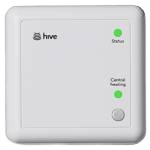Hive SLR1
| Model | SLR1 |
| Vendor | Hive |
| Description | Heating thermostat |
| Exposes | climate (occupied_heating_setpoint, local_temperature, system_mode, running_state), temperature_setpoint_hold, temperature_setpoint_hold_duration |
| Picture |  |
Notes
Pairing
To pair the thermostat with Zigbee2MQTT, follow these steps:
- Temporarily disconnect any thermostat controllers connected to the thermostat by remove a battery from them.
- Turn the thermostat and boiler off, then on again to ensure it is not trying to connect to any thermostat controllers.
- Once the thermostat and boiler are on, hold down the Central heating button on the device until the Central heating'light turns white/ pink, then release the button. This will enable stand-alone mode on the thermostat.
- Hold down the central heating button again until the Central heating light begins to flash amber. The device is now in pairing mode and should be found by Zigbee2MQTT.
- You can now re-insert the battery back into any thermostat controllers disconnected in step 1 and pair them to the boiler (and optionally Zigbee2MQTT). For information on pairing the thermostat controllers see the pairing instructions for the Hive SLT3B. Note that the thermostat's Central heating light will remain amber until a controller is paired with the thermostat, however the thermostat will still function correctly.
How to start/edit native boost
The receiver has support for native Boost, which will allow to display the remaining time on a compatible remote.
To start one, or modify an already active one, send the following payload to the topic zigbee2mqtt/FRIENDLY_NAME/set:
{
"system_mode":"emergency_heating",
"temperature_setpoint_hold_duration":30, // Replace with desired duration in minutes. Max 360. 0 to stop
"temperature_setpoint_hold":1,
"occupied_heating_setpoint":18 // Replace with desired temperature. Between 5 and 32 C
}
Note: For device timing reasons, the payload needs to be sent as one single command. Sending individual commands or settings attributes manually using the Frontend will not work.
Also, the native boost can be used as a method to pause the heating too. To do so, set the temperature to a low value.
Set heating mode to ON
Send the following payload to the topic zigbee2mqtt/FRIENDLY_NAME/set:
{
"system_mode":"heat",
"temperature_setpoint_hold":1,
"occupied_heating_setpoint":20 // Replace with desired temperature. Between 5 and 32 C
}
Note: You will also notice that temperature_setpoint_hold_duration automatically changes to 65535 which means undefined (indefinite).
This will also stop any native boosts that are currently active.
Set heating mode to OFF
Send the following payload to the topic zigbee2mqtt/FRIENDLY_NAME/set:
{
"system_mode":"off",
"temperature_setpoint_hold":0
}
Note: You will also notice that temperature_setpoint_hold_duration automatically changes to 0 which means not set. occupied_heating_setpoint automatically changes to 1 degree C.
This will also stop any native boosts that are currently active.
Options
How to use device type specific configuration
thermostat_unit: Controls the temperature unit of the thermostat (default celsius). The value must be one ofcelsius,fahrenheit
Exposes
Climate
This climate device supports the following features: occupied_heating_setpoint, local_temperature, system_mode, running_state.
occupied_heating_setpoint: Temperature setpoint. To control publish a message to topiczigbee2mqtt/FRIENDLY_NAME/setwith payload{"occupied_heating_setpoint": VALUE}whereVALUEis the °C between5and32. To read send a message tozigbee2mqtt/FRIENDLY_NAME/getwith payload{"occupied_heating_setpoint": ""}.local_temperature: Current temperature measured on the device (in °C). To read send a message tozigbee2mqtt/FRIENDLY_NAME/getwith payload{"local_temperature": ""}.system_mode: Mode of this device. To control publish a message to topiczigbee2mqtt/FRIENDLY_NAME/setwith payload{"system_mode": VALUE}whereVALUEis one of:off,auto,heat. To read send a message tozigbee2mqtt/FRIENDLY_NAME/getwith payload{"system_mode": ""}.running_state: The current running state. Possible values are:idle,heat. To read send a message tozigbee2mqtt/FRIENDLY_NAME/getwith payload{"running_state": ""}.
Temperature setpoint hold (binary)
Prevent changes. false = run normally. true = prevent from making changes. Must be set to false when system_mode = off or true for heat. Value can be found in the published state on the temperature_setpoint_hold property. To read (/get) the value publish a message to topic zigbee2mqtt/FRIENDLY_NAME/get with payload {"temperature_setpoint_hold": ""}. To write (/set) a value publish a message to topic zigbee2mqtt/FRIENDLY_NAME/set with payload {"temperature_setpoint_hold": NEW_VALUE}. If value equals true temperature setpoint hold is ON, if false OFF.
Temperature setpoint hold duration (numeric)
Period in minutes for which the setpoint hold will be active. 65535 = attribute not used. 0 to 360 to match the remote display. Value can be found in the published state on the temperature_setpoint_hold_duration property. To read (/get) the value publish a message to topic zigbee2mqtt/FRIENDLY_NAME/get with payload {"temperature_setpoint_hold_duration": ""}. To write (/set) a value publish a message to topic zigbee2mqtt/FRIENDLY_NAME/set with payload {"temperature_setpoint_hold_duration": NEW_VALUE}. The minimal value is 0 and the maximum value is 65535.
